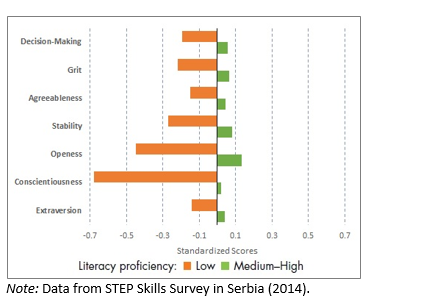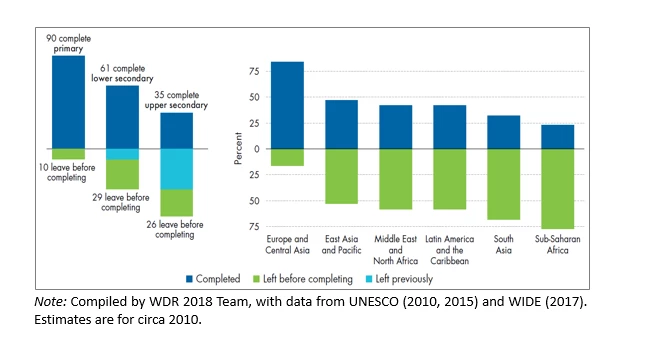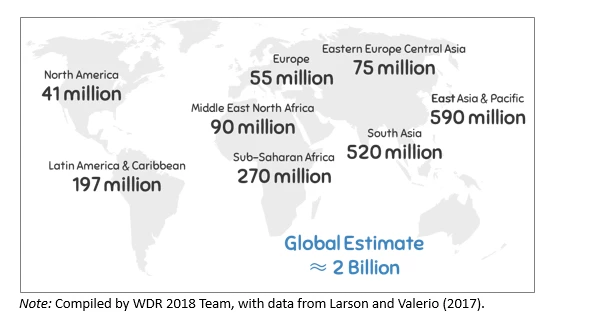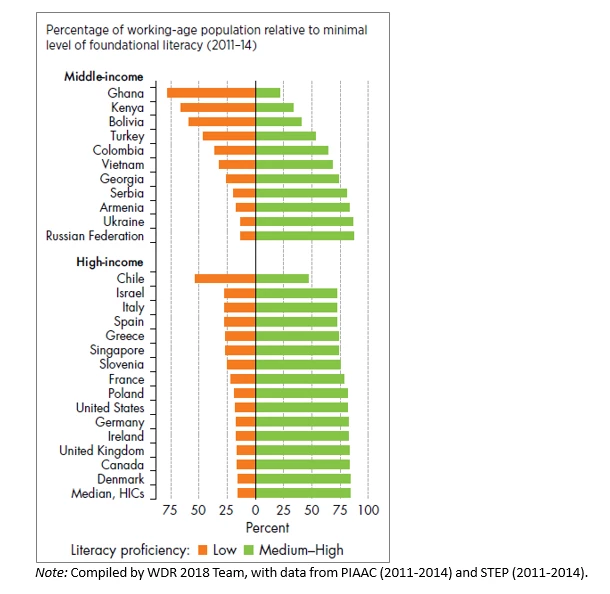In a recent exhibition at the American Museum of Natural History in New York City, “Dinosaurs Among Us,” paleontologists use prehistoric fossil records of bones, feathers, and nests to show that some dinosaurs did not go extinct but, rather, evolved into the creatures we see today. The links they trace show how avian dinosaurs (ones that fly) evolved into modern-day birds. Paleontologists argue that avian-dinosaurs’ swift aerial mobility played a key role in determining their survival while their land-based relatives failed to thrive. Flight enabled them to relocate and adapt to drastically changing environments—a skill that their land-based relatives lacked.
Figure 1. Paleontologists argue that avian-dinosaurs (left) adapted to the changing environment quickly and evolved into birds (right).
Source: http://www.amnh.org/exhibitions/dinosaurs-among-us/
Fast-forward to today’s world: The way we work and the types of jobs available are transforming more rapidly than ever before – enhanced by technological advancements and global trade. Machine automation and outsourcing have drastically altered the nature of work and brought about seismic shifts globally. Young people today need new skills to meet changing labor market demands. In the upcoming World Development Report 2018, we tackle this issue and ask: how can we help prepare young people to be more ‘adaptable’ in facing new challenges ahead?
The Skills Gap
A classic conception of human capital focuses on individuals’ ability to adapt and cope with change. In the labor market, this translates to having foundational skills such as literacy, numeracy, socio-emotional and problem solving skills that provide scaffolding for acquiring new skills and finding a job that best matches individuals’ skillsets. Yet globally, an average of two thirds of young people leave formal education prematurely without developing solid foundational skills required to meet demands on the job (Figure 2). As a result, many become unemployed or find themselves trapped in low-wage, low-quality, unstable jobs that offer little career mobility or opportunity for income growth.
Figure 2. Of every 100 students entering primary education, just 35 complete upper secondary education.
Among various foundational skills, literacy serves as the prerequisite to obtaining proficiency in numeracy and accelerates the development of socio-emotional and complex problem solving skills. In Serbia, for instance, our results indicate that higher literacy is associated with higher scores for socio-emotional traits that are valuable to success in the workplace, including extraversion, conscientiousness, openness, stability, agreeableness, grit, and decision making (Figure 3). Importantly, higher literacy proficiency is also associated with more frequent use of skills in the workplace, including complex skills such as problem solving.
Figure 3. Serbia: Association between literacy proficiency and socio-emotional skills
To measure literacy proficiency among adults, our Skills Towards Employability and Productivity (STEP) construct avoids narrowly defining literacy skills or using self-reported results. Instead, we characterize literacy as representing a range of skills, from the decoding of written words and sentences to the comprehension, interpretation, and evaluation of texts that are of varying complexity and fit workplace, personal, society, and community contexts. Using both STEP measures and results from the OECD’s Programme for the International Assessment of Adult Competencies (PIAAC) surveys, we classify individuals who score at or below Level 1 (scoring 225 points or less on a 500-point scale test) as low proficiency. This means their literacy limits them to understanding basic texts without giving them the ability to integrate, evaluate, or interpret information from a variety of materials.
Globally, we estimate that more than 2 billion working-age adults (ages 15–64) are not equipped with the most essential literacy skills required by employers and for enrollment in demanding job-training programs (Figure 4). Among young adults (ages 15–25), this number is about 420 million. The implications of this global issue will be felt more acutely as we see the nature of jobs continue to shift. Such a deficit in cognitive and socioemotional skills excludes many low-skilled workers from reaping the benefits of a globalized economy.
Figure 4. Roughly 2 billion adults (15-64) around the world have low literacy skills.
Low literacy is not a unique challenge for low-income countries, of course. The problem extends to middle and high-income countries where, on average, between 10 and 26 percent of working-age adults are below minimum literacy proficiency (Figure 5). Across country contexts, we find that low-skilled adults are more likely to work in low-productivity jobs, and less likely to use their skills at work or benefit from workplace skills upgrading opportunities.
Figure 5. Wealthier countries have higher literacy levels, but all countries face low-literacy challenges
What can we do?
Improving literacy skills can both boost workers’ labor-market trajectories and move countries toward the technology frontier, where their industries can occupy a skilled and sophisticated segment in the global value chain. For instance, existing evidence shows that the investment pays off. Wage payoffs to individuals are substantial in both low-middle-income and high-income contexts. We also show that employed working-age adults who meet at least Level 2 of literacy proficiency are much more likely to hold high-skill, better paid white collar jobs. At the country aggregate level, we also find that higher average levels of literacy proficiency are associated with more frequent use of skills in the workplace and with higher output per worker.
While solutions are likely to be context-specific, an obvious direction to improve foundational skills is by promoting education quality and ensuring that youth stay in school. Intervention programs in India and Mexico City, which offer additional academic instruction and psychosocial support to disadvantaged students, show positive impacts on students’ remaining in school and on their learning. Existing evidence also suggests that socio-emotional skills development holds promise not only for improving near-term learning outcomes but also for improving well-being in later adulthood. Another effective approach is identifying student needs early; for instance, in California, an upper secondary assessment program that provides information on academic standing and course guidance to at-risk students shows declining needs for remediation at later stages of their education.
Many young people leave the school system before they develop a solid foundation of skills. It is crucial to catch these school leavers with high-quality second-chance programs that provide equivalency pathways to upper-secondary education and diplomas. In Sub-Saharan Africa and many low-income and conflict areas, there is high demand to reengage early school leavers. Equivalency and second-chance programs are shown to improve students’ education and economic prospects in the Asia Pacific region, especially when programs are aligned with the formal education system. Experiences in Latin America and the Caribbean show that one effective way to connect young people to pathways for further education and a safe and productive adulthood is to take into account their multidimensional needs. Importantly, in these programs character and socio-emotional skills development play crucial roles in leveraging student success.
Skills training programs that partner with employers and sustain their commitment to train young people can result in positive outcomes. For instance, automakers such as BMW and Nissan are piloting training centers that provide intensive skills development for young adults. Other successful program features include having high-quality intermediaries, comprehensive recruitment services to generate good matches between prospective participants, programs of study, targeted occupations, and individualized services to support training completion and success on the job. Last but not least, context plays an important role in program effectiveness; the general economy of a given country and other demand-side factors are important considerations when implementing skills upgrading programs.
Looking Ahead
In order to adjust to a fast-shifting social and work environment, young people are required to update their skillsets quickly. To this end, a strong scaffold of foundational skills is required for lifelong learning and growth. For this to happen, education systems must deliver learning for all. As we strive toward this goal, we also need second-chance programs to provide additional opportunities to get low-skilled youth back on track. Ultimately, it is crucial to engage employers early, frequently, and meaningfully to leverage public investments in skills development and human capital formation. Just as the avian dinosaurs benefitted from their wings millions of years ago, foundational skills can now prepare young people to survive change and soar.






Join the Conversation